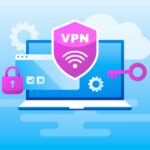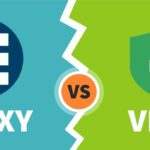Every time you go online, you leave tracks. Websites, advertisers, and even your internet provider watch where you go and what you do. This constant monitoring erodes your privacy. A Virtual Private Network (VPN) is a powerful tool designed to give you that privacy back. It creates a secure space for you to browse the internet without being watched.
This article will explain the main ways a VPN protects your personal information. We will cover how it hides your identity, stops your internet company from spying on you, and keeps you safe on public Wi-Fi. Understanding these benefits is the first step to reclaiming your digital privacy. For a basic overview of what a VPN is, you can check out our guide here.
How Does a VPN Hide Your Real Identity and Location?
A VPN hides your real identity and location by masking your device’s IP address with one from its own server network. Every device connected to the internet has a unique IP address. This address is like a digital home address; it reveals your approximate location and can be used to identify you through your Internet Service Provider (ISP).
When you connect to a VPN, your internet traffic is routed through a remote server. The websites you visit only see the IP address of that VPN server, not your own. For example, if you are in Toronto and connect to a server in Australia, websites will think you are browsing from Australia. This simple switch makes it much harder for anyone to link your online activity directly back to you or your physical location. This process of rerouting your traffic is a core part of how a VPN works to protect you.
Can a VPN Stop Your Internet Service Provider (ISP) from Spying on You?
Yes, a VPN completely stops your ISP from seeing your browsing activity and the data you transfer. Your ISP is the company you pay for internet access, like Comcast or Verizon. They can see every website you visit, every video you watch, and how long you spend online. In many countries, ISPs are allowed to collect this data and sell it to advertisers for targeted marketing.
A VPN prevents this by encrypting your internet traffic. Encryption scrambles your data into an unreadable code. When your traffic is encrypted, all your ISP can see is that you are connected to a VPN server. They cannot see the websites you are visiting, the information you are downloading, or the services you are using. This puts a wall between your personal habits and your ISP, restoring a major piece of your online privacy.
| What Your ISP Sees Without a VPN | What Your ISP Sees With a VPN |
|---|---|
| Your real IP address | The IP address of the VPN server |
| The domain names of websites you visit (e.g., google.com) | A connection to the VPN server (unreadable data) |
| How much time you spend on each site | The amount of data you are transferring |
| Your unencrypted emails and messages | Your encrypted data packets (scrambled) |
How Does a VPN Protect You on Public Wi-Fi Networks?
A VPN protects you on public Wi-Fi by encrypting your connection, which stops hackers on the same network from stealing your data. Public Wi-Fi networks in places like coffee shops, airports, and hotels are often not secure. They are a common target for cybercriminals who use special software to perform “man-in-the-middle” attacks. This allows them to intercept the traffic of anyone using the network.
Without a VPN, any data you send over public Wi-Fi—like passwords, credit card numbers, or private messages—is sent in the open. It’s like shouting your secrets in a crowded room. A VPN creates an encrypted tunnel between your device and the internet. Even if a hacker intercepts your data, all they get is a useless stream of scrambled code. This protection is essential for anyone who uses public Wi-Fi for work, banking, or personal communication.
Can a VPN Help You Avoid Online Tracking and Advertisers?
Yes, a VPN significantly reduces online tracking by hiding your IP address and encrypting your traffic, making it harder for advertisers to build a profile on you. Advertisers and data brokers use sophisticated methods to track you across the internet. They place cookies in your browser, use browser fingerprinting techniques, and monitor your IP address to see what websites you visit.
By masking your IP address, a VPN breaks a key link in this tracking chain. Websites and ad networks can no longer use your IP to link your activity on different sites together. While a VPN does not block cookies, it makes the data they collect far less valuable because it is not tied to your real location or ISP. This reduces the effectiveness of targeted advertising and helps you maintain a more anonymous online presence.
What About Browser Fingerprinting?
A VPN helps but does not completely stop browser fingerprinting. Browser fingerprinting is a technique where websites collect information about your browser, device, screen resolution, fonts, and other settings. This combination of settings can be unique enough to identify you even without cookies.
A VPN helps by hiding your IP address, which is a major part of the fingerprint. However, websites can still gather the other technical details. For maximum privacy, it’s best to use a VPN in combination with a privacy-focused browser that has anti-fingerprinting features enabled.
Does Using a VPN Protect You from Government Surveillance?
Yes, a VPN can protect you from mass government surveillance programs by encrypting your data and hiding your IP address. Many governments run programs that monitor and collect vast amounts of internet data from their citizens. These programs can involve tapping into the infrastructure of ISPs and directly monitoring internet traffic.
When you use a VPN, your data is encrypted end-to-end. This means that even if a government agency intercepts your traffic, they cannot read its contents. Your browsing history, messages, and downloads remain private. Furthermore, by hiding your IP address, a VPN makes it much more difficult to tie your online activity back to you personally. For journalists, activists, and individuals living in countries with restrictive internet policies, a VPN is a critical tool for freedom of expression and safety.
Conclusion
Using a VPN is one of the most effective steps you can take to protect your online privacy. It works on multiple levels to keep your personal information safe. A VPN hides your real location by masking your IP address, stops your ISP from monitoring your every move, and secures your data on risky public Wi-Fi networks. It also makes it much harder for advertisers and government agencies to track and profile you.
In a world where your data is constantly being collected, a VPN gives you control. It creates a private space for you to browse, communicate, and work without being watched. If you value your privacy, using a trustworthy VPN service is no longer just an option—it’s a necessity. To learn more about protecting your digital life, visit our homepage at SoftwarePair.
FAQ Section
Will a VPN make me completely invisible online? No, a VPN will not make you completely invisible. While it provides a strong layer of privacy by hiding your IP address and encrypting your data, you can still be tracked through other means like cookies or if you log into personal accounts. It is a tool for privacy, not total anonymity.
Can a VPN block all ads and trackers? No, a VPN itself does not block ads or trackers. It prevents trackers from seeing your real IP address and encrypts your data, which makes tracking less effective. To block ads and trackers directly, you would need to use a VPN in combination with other tools like an ad-blocker browser extension.
Is using a VPN legal for protecting my privacy? Yes, in most democratic countries, using a VPN for privacy and security is perfectly legal. It is a standard tool used by millions of people and businesses every day. However, you should always be aware of the laws regarding VPN use in your specific country or any country you are visiting.


